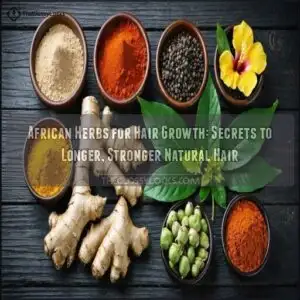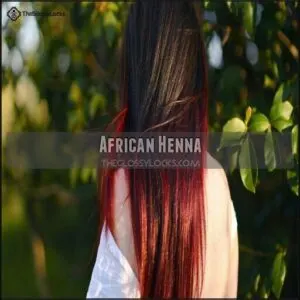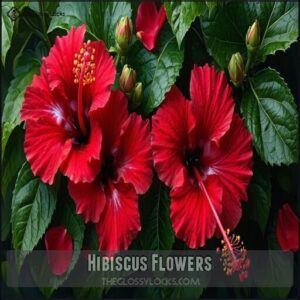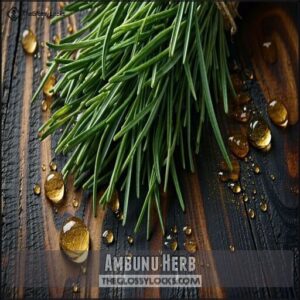This site is supported by our readers. We may earn a commission, at no cost to you, if you purchase through links.
 African herbs for hair growth like henna, chebe powder, ginger root, hibiscus, and ambunu can help you grow stronger, healthier hair naturally.
African herbs for hair growth like henna, chebe powder, ginger root, hibiscus, and ambunu can help you grow stronger, healthier hair naturally.
Henna thickens strands while conditioning your scalp, and chebe powder locks in moisture, which is key for length retention.
Ginger root improves blood circulation to your scalp, encouraging growth—plus, it smells amazing! Hibiscus strengthens your roots and reduces breakage, and ambunu works as a natural detangler while nourishing your hair.
It’s like having a whole botanical toolkit for your crown. Ready to discover the secret to flourishing hair? These herbs offer the perfect blend of strength and beauty.
Table Of Contents
- Key Takeaways
- African Henna
- Chebe Powder
- Ginger Root
- Hibiscus Flowers
- Ambunu Herb
- Frequently Asked Questions (FAQs)
- What are the best African herbs to use for hair growth?
- How frequently should African herbs be used for hair growth?
- What are the benefits of Baobab for hair?
- How does Rooibos tea support scalp health?
- Can African Black Soap stop hair thinning?
- Does lavender oil help with hair shedding?
- What makes burdock root effective for hair loss?
- Conclusion
Key Takeaways
- Henna strengthens hair, reduces breakage, and boosts shine when used as a paste on your hair and scalp.
- Chebe powder locks in moisture, boosts length retention, and prevents dryness when applied weekly.
- Ginger root improves blood circulation to your scalp, tackles dandruff, and promotes stronger growth with simple DIY treatments.
- Hibiscus fights breakage, boosts scalp health, and locks in moisture when used in oils or as a conditioning paste.
African Henna
If you’re looking for a natural way to strengthen your hair and fight breakage, African henna might be your new best friend.
It binds to the proteins in your hair, leaving it stronger, shinier, and ready to take on the world.
How to Use Henna for Hair Growth
If your hair could talk, it would thank you for introducing it to the wonders of henna. Start by creating a rich paste using henna powder and water.
Your hair will love the strength, shine, and care that henna brings with every application—nature’s gift to healthy locks.
For added oomph, mix in hibiscus flowers, ambunu herb, or castor oil. With these African herbs in the mix, you’re setting your hair up for success.
Apply this paste generously to your scalp and strands, then massage gently like you’re pampering a spa guest. Cover up with a trusty shower cap and let the magic work for two hours before rinsing thoroughly.
Many users find henna boosts growth to be a huge difference. Whether you’re chasing thicker, stronger hair or hoping to ward off breakage, using this remedy weekly or monthly can make a significant impact on achieving healthy hair.
Take Your Henna Treatments to The Next Level
Not all henna treatments are created equal.
Try henna blends with aloe or hibiscus for extra moisture. Tailor application techniques to your hair porosity—low porosity loves heat!
Experiment with color variations by mixing African henna with indigo. For enhanced benefits, consider a henna aloe blend.
Aftercare tips? Deep condition to lock in hydration. These herbal treatments take your hair growth game to the next level with extra moisture!
Chebe Powder
If African herbs had a superstar, Chebe powder would be it. Hailing from Chad, this hair growth secret strengthens and moisturizes like nothing else.
Chebe powder is the ultimate hair hero, locking in moisture and boosting length for irresistibly strong, healthy strands.
Made from wild seeds and plants, its benefits have stood the test of time.
- Locks in moisture, preventing breakage.
- Boosts hair length by supporting healthy strands.
- Fights dryness, leaving hair soft and manageable.
Mix Chebe powder with oils or henna, apply weekly, and let it work while you sleep. Say hello to longer, stronger hair naturally!
Ginger Root
Think of ginger root as your scalp’s cheerleader—it boosts circulation, tackles dandruff, and strengthens hair.
This African herb is packed with anti-inflammatory properties and nutrients that encourage hair growth and thickness. Mix shredded ginger or ginger powder with coconut oil for a nourishing treatment. Massage the paste into your scalp to stimulate blood flow.
Sensitive skin? Dilute ginger with water for gentler care. Ginger benefits don’t stop there—it’s your secret weapon for stronger, healthier locks.
| Method | Ingredients | Time | Benefits |
|---|---|---|---|
| Shredded Ginger Paste | Ginger + Coconut Oil | 30 Minutes | Nourishes scalp |
| Ginger Juice Massage | Fresh Ginger Juice | 15 Minutes | Boosts scalp circulation |
| Diluted Ginger Spray | Ginger + Water | Daily Use | Gentle dandruff treatment |
| Ginger Powder Mask | Powder + Carrier Oil | Weekly Treatment | Thickens hair strands |
Hibiscus Flowers
Hibiscus flowers are a natural powerhouse for healthy hair, packed with vitamin C to boost collagen and promote growth.
If you’ve ever dreamed of stronger, shinier locks, this vibrant flower might just be your new best friend, offering a way to achieve healthier hair.
How to Use Hibiscus for Hair Growth
Revive your hair with hibiscus—a powerhouse herb for healthy, strong tresses.
To use hibiscus for hair growth:
- Create a paste with hibiscus powder and water or mix it into your conditioner.
- Apply evenly from scalp to tips for maximum benefits.
- Leave it on for 20–30 minutes, or overnight for deeper nourishment.
- Rinse thoroughly and enjoy the silky shine.
This African herb boosts scalp health, fights breakage, and locks in moisture—no harsh chemicals, no stress.
Hibiscus also contains properties that prevent dryness and frizz.
How Often to Do a Hibiscus Hot Oil Treatment
If you’re serious about achieving healthy hair growth, adding hibiscus hot oil treatments to your regimen is a fantastic idea.
These treatments work best when done monthly, letting your hair soak up all the goodness without overloading your strands. Start by picking a hair growth oil that suits your scalp sensitivity and hair porosity—coconut and olive oil are great options.
Heat a small amount, then mix in crushed hibiscus flowers for their vitamins and scalp-nourishing properties. Massage the warm mixture into your scalp and hair, focusing on roots and ends.
You can also find pre-made options for convenience. Leave it in for 20 minutes—the perfect window to sip tea or scroll your favorite playlist—then shampoo it out.
With consistent use, you’ll notice stronger, longer hair over time. Track your results, and soon, you’ll be sharing your own hair growth tips!
Ambunu Herb
Still exploring ways to improve your hair health? Ambunu is a game-changer! This African herb, packed with nourishing saponins, cleanses without stripping natural oils. Its detangling properties make managing your locks a breeze, while offering powerful scalp hydration.
Ayurvedic practices suggest that treatments like Shiro Abhyanga massage can also improve blood circulation to the scalp.
- Promotes hair strengthening and elasticity.
- Encourages natural hair growth by soothing the scalp.
- Boosts moisture retention, fighting dryness.
Mix Ambunu into a herbal wash or conditioner for silky, strong tresses. Feel the difference your hair craves!
Frequently Asked Questions (FAQs)
What are the best African herbs to use for hair growth?
Did you know rosemary oil can boost hair growth by 22% in six months?
Pair it with African black soap or chebe powder for scalp health, stronger strands, and a touch of timeless tradition!
How frequently should African herbs be used for hair growth?
Use African herbs like Chebe, henna, or hibiscus 1-2 times weekly for consistent results.
Overusing them might overwhelm your scalp.
Think of it like watering plants—you want growth, not soggy roots!
What are the benefits of Baobab for hair?
Don’t underestimate baobab! This “tree of life” deeply hydrates your scalp, strengthens hair strands, and boosts elasticity.
Packed with vitamins and antioxidants, it’s like giving your hair a rejuvenating smoothie that fights breakage and adds bounce!
How does Rooibos tea support scalp health?
Rooibos tea packs a punch with antioxidants like zinc, calming scalp irritation, reducing dandruff, and promoting healthier hair follicles.
Think of it as a spa day for your scalp—relaxing and rejuvenating, all-natural goodness!
Can African Black Soap stop hair thinning?
African Black Soap can help reduce hair thinning by promoting scalp health and stimulating the hair growth cycle.
Its natural ingredients support a clean, balanced scalp, which is key to reducing shedding and improving thickness.
Does lavender oil help with hair shedding?
Think of lavender oil as your hair’s chill pill.
It boosts scalp circulation, fights inflammation, and reduces stress—all culprits behind shedding.
Massage it weekly, and you’ll likely notice healthier, stronger hair sticking around longer, thanks to its ability to boost scalp circulation.
What makes burdock root effective for hair loss?
Burdock root fights hair loss by nourishing your scalp with vitamin A and essential fatty acids.
It soothes irritation, promotes stronger roots, and combats dryness.
Think of it as your scalp’s personal spa day in a bottle!
Conclusion
Who doesn’t want healthier, longer hair?
Using African herbs for hair growth like henna, chebe powder, ginger root, hibiscus, and ambunu can transform your hair care routine.
They strengthen strands, boost scalp health, and lock in moisture—all naturally.
Try a hot oil treatment with hibiscus or a detangler with ambunu to see real results.
With these powerful botanicals, your hair has the tools to thrive.
Start today and let your natural beauty shine!






